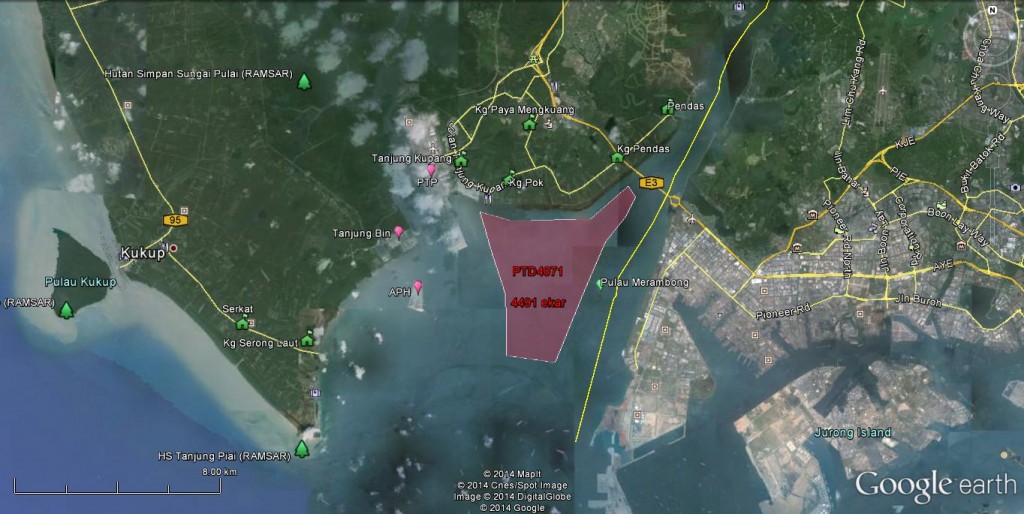By Mahdzir Ibrahim,
Traditional fishermen are those who use traditional equipment such as fishing rod, fish cages or nets with the small boat and outboard engine to fish. They also include those who collect shellfishes and snails at the shore.
Reports of the country’s total fishing catches in 2011 shows that the quantity of inshore fish catches reaches 65 per cent compared with the deep-sea fish catch which recorded only around 17 per cent of the total. Therefore, it is only apt that the traditional fishermen deserve more attention.
In terms of the size or area of inshore fishing operations, it is around five nautical miles from the coastline. As a whole the area of operation is not so wide due to the size of the boat and the engine capacities of the fishermen.
Inshore Reclamation Project
The traditional fisherman workstations or base is in the coastline area, which means anything that happens in and around the shore area will directly affect them and their work.Any sea reclamation projects that takes place within the radius of five nautical miles around the coastline without proper planning, it is a destructive development.
Sea reclamation project with no proper planning means project that is carried out without in-depth study or without regard to side effects. This also means the project is wrong, morally and legally.So it should aptly be named as ‘crazy’ project. When this ‘crazy’ project is carried out, it will cause a negative impact to the ecosystem around the affected area.
As a result the fishes and their food sources such as seaweed and seeds or fish fries will be significantly reduced, the water quality will decline, the mangrove forest will be lost and the beach will be eroded along with the coral reefs and eventually the original life forms there will die off and part of it will drift to the high seas.
Imagine if your office or working place was disturbed, discoloured or been damaged by other people. How would you handle it? Would the traditional fishermen be able to venture into deep sea fishing with the small boat and engines that they have?
In the next five to ten years, inshore fishermen will face declining catches and eventually they will lose their source of income; ultimately the effect will also be felt by us as consumers. Maybe not now, but it will surely come.
Ubah Island Project
One example of this ‘crazy’ project is now being carried out in the waters of Tanjung Kupang, located in the Straits of Johor. Gelang Patah MP Lim Kit Siang has named it as ‘Ubah Island’. The size of the project area is approximately two thousand five hundred acres. It is located about 10 km from the Singapore coastline. On the map, this area shows that it is located within the Iskandar Development Region (IRDA).
The reclaimed sea area was originally a clean and beautiful place, like a garden with fertile soil. The Shoreline Management Plan 2013 document has identified the waters of Tanjung Kupang area as having a very rich marine biodiversity because it has seaweed (sea grass beds) which may be among the largest in the world.
It is also the breeding habitat of the sea horse, as well as dugongs’ play area. In fact, IRDA itself has suggested that this area is should be protected and gazetted as a marine protected area.
But these waters are now being transformed (reclaimed) into an island for unknown purposes. In the document of Comprehensive Development Plan (CDP) approved by IRDA as the Iskandar Malaysia Masterplan, the ‘Ubah Island’ does not exist at all in the masterplan. However the island is now growing in size, qualifying this is as the first ‘miracle’.
 The question is, how was this project carried out without an environmental impact assessment report (EIA) from the Department of Environment (DOE)? Do the state agencies not know or do not care about this matter?
The question is, how was this project carried out without an environmental impact assessment report (EIA) from the Department of Environment (DOE)? Do the state agencies not know or do not care about this matter?
Or, is this project getting protection from certain parties? Or are the agencies that are responsible just closing their eyes to this ‘crazy’ project? If that is so, whose power is being used to instruct them to close their eyes? This must be the second ‘miracle’.
All of these questions are related to the issue of integrity of the state and of good governance. Overall the project has show a lack of transparency from the authorities. No plan, no signage project and also no EIA report.
Johor state government needs to be reminded that, in the words of the late Karpal Singh, ‘jangan main-main dengan undang-undang’ (don’t play with the laws).
Calling the kettle black
If we relook at the history of this reclamation issue, certainly Malaysians have not forgotten about the Singapore government’s attempt of doing a reclamation project at Pulau Tekong in 2002. During that time we protested and opposed them.
At that time we had questioned the Singapore government’s move which will affect the economy and the ecosystem of our waters. Media report and coverage on the issue were widespread, seemingly showed that we were so concerned about the environment and its impact on the local economy.
But apparently, the protest is just another form of political hypocrisy of our government. Then, we had opposed the Singaporean government vigorously; now we are making the same move like them. In fact, our mainstream media is keeping silent about this ‘crazy’ project.
If we are to examine deeper about Pulau Tekong reclamation project, part of the sand and the stone that would have been used for the reclamation project was to have come from Malaysia as well. But it was not widely reported by the mainstream media then.
In the case of this Ubah Island, Singapore hasn’t protested to this project like our government. Why? Is it because they are aware that the objection will create tension between the two countries? Or is Singapore intentionally allowing it because this reclamation project will eventually ‘bridge’ the peninsular with the Lion state for their strategic benefit?
Administrative Integrity and Rights
The question of the integrity of the state government and the traditional fishermen are very important matters. The transparency of the state administration will determine the future of the local economic development, food supplies and the future of traditional fishermen.
We need to ensure the existence of the traditional fishermen, not because we want them to continue to be traditional fishermen, but we want it to be preserved because it is their right.
Therefore as a responsible government, their rights to be fisherman must be protected by the government. The people also have the right to ensure the supply of seafood is guaranteed and the environmental rights must also be protected. And all of this is the people’s right to progress and development in the right manner.
As a responsible government, BN shouldn’t stop being a ‘pot calling the kettle black.’
Mahdzir Ibrahim is a fan of arts and culture, a national executive committee member of the DAP Socialist Youth (DAPSY) and also a state committee member of Johor DAP




